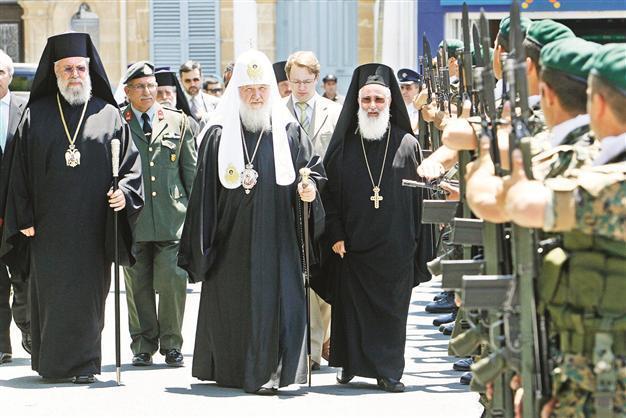Russians divided over Church’s role in politics

Russian Orthodox Patriarch Kirill (C) and Greek Cyprus’ Archbishop Chrisostomos (L) review a military guard of honor before their meeting in Nicosia in this June photo. AP photo
An anti-Kremlin protest by three women on the altar of Moscow’s main cathedral has united many Russian Orthodox believers in outrage, but their trial has exposed deep rifts over the Church’s role in politics.
On her way out of the Church of the Resurrection, in a leafy neighborhood of central Moscow, Nina Lefshukova pulled off her blue headscarf and sighed that the three members of the punk band Pussy Riot should be freed.
“I would let them go and leave them in peace, but everyone knows it has more to do with politics than religion. It has more to do with the authorities,” she said, folding up her blue Orthodox headscarf into a black bag. Maria Alyokhina, 24, Nadezhda Tolokonnikova, 22, and Yekaterina Samutsevich, 30, stormed into Moscow’s Christ the Savior Cathedral on Feb. 21 and belted out a “punk prayer,” asking the Virgin Mary to “Throw Putin out!”
They were charged with hooliganism motivated by religious hatred. A judge will deliver her verdict in a Moscow court tomorrow. The Church has called for “divine retribution” against the women. The three say the protest was a way to fight President Vladimir Putin’s tightly controlled political system and draw attention to the strengthening relationship between the Kremlin and the Russian Orthodox Church.
Most believe the Church should stay out of politicsToday half of Russians believe the Church, which is led by Patriarch Kirill, has a hand in domestic politics, according to an opinion poll released on Aug. 14 by the Russian Public Opinion Research Center, and 43 percent feel it interferes in foreign affairs. The poll showed three quarters of respondents believe it should stay out of politics.Many were disturbed when Kirill, speaking before the March 4 presidential election, called Putin a “miracle of God.”
“When the patriarch supports a political cause, he loses something. He loses his authority as a spiritual leader. He is perceived as being on Putin’s team, and the case with Pussy Riot shows how close the patriarch is to Putin,” said Alexei Malashenko, an expert on religion at the Carnegie Moscow Center think tank. “The Church is at a crossroads ... and believers are divided,” he said.
Believers and analysts say the Church may have gained some support for its harsh stance against the protest, especially in regions outside of Moscow, although the three women insist it was not aimed against the Church. Sitting in a frescoed recess of the Kazan Cathedral, only steps away from the Kremlin on Red Square, Archbishop Igor Fomin said the protest had insulted churchgoers, but he likened their response to the defiance shown by believers during decades of Soviet Communist rule.
“Persecution always makes people stronger, and it will cause a Russian’s faith to rally during times of trouble,” he said. “Our numbers and our congregation have increased. We have a full church of people.”
Christianity is by far the most popular religion in Russia, with some 70 percent of the population saying they are Russian Orthodox Christians, although far fewer regularly attend church. For some, a negative view of the Church survives since the fall of the Soviet Union, when it was given rights to import and sell cigarettes without paying import taxes. Despite the Patriarch’s promotion of Putin before the election, the Church denies being involved in politics.
“Although they try to accuse us of advocating for the authorities, we’re not trying to call on people to vote for the authorities, but for the path, the direction in which we must move,” Archpriest Fomin said.
